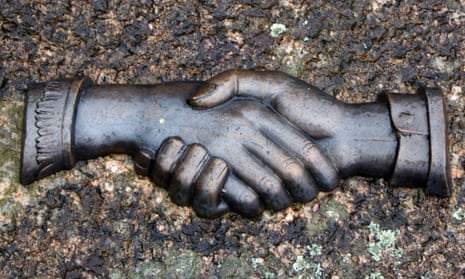Lost in the venomous arguments that have recently been flying back and forth between Muslims and atheists – on HBO and on op-ed pages, in the United States and beyond – is just how much these two marginalized, underrepresented groups have in common.
According to a Pew poll conducted this year, Muslims and atheists are the two least favorably viewed religious or ethical groups in the US. Both communities are severely underrepresented in the general population – roughly 2% of Americans identify as atheists, compared to 1% for Muslims. Both face rising levels of animosity from the general public. And both tend to be defined by the loudest voices within their communities.
The media may be saturated with images of Islamic terrorists and suicide bombers, but a 2011 Gallup survey concluded that Muslims are actually more likely than any other religious or ethical group in America to reject violence against civilians. At the same time, the vocally “anti-theist” atheists who dominate the airwaves and the bestseller lists may get all the press, but a 2013 study from the University of Tennessee indicated that less than 15% of atheists fall into the “anti-theist” category.
So why hasn’t there been more dialogue and solidarity between Muslims and atheists? Can’t we all just get along?
The divide has to do in part with our natural inclination to retreat into our own communities or get defensive when confronted with difference. As a result, stereotypes about both groups not only go unchallenged – they become amplified as each side clings to its preconceived notions of the other. While it’s certainly not the only cause, the amplification of this “us against them” attitude has contributed to large majorities of Americans labeling Muslims as “violent” and atheists as “amoral”.
The irony is that when atheists and believers get to know one another, they often discover that many of their values are not so different after all. That is something that we, a Muslim and an atheist, have learned from our friendship – even as we acknowledge our differences and disagreements.
We’re not alone in recognizing the power of relationships to overcome differences. Research shows that simply knowing someone from another religious or ethical group often leads to more positive views of that group. That’s why personal relationships are indispensable when it comes to changing how we talk about religion and atheism. When you know and admire a Muslim or an atheist, it no longer makes much sense to make sweeping generalizations about either group as made up of fanatics or bigots. The logic of blanket statements falls apart when you’re confronted with the diversity of lived religious and nonreligious experience.
When 46% of Americans think Islam is more violent than other faiths but only 37% even know a Muslim, and when atheists remain one of the most distrusted groups in the country, it’s clear that a conversation between these two communities could benefit both. But that won’t happen until we Muslims and atheists commit to spending less time speaking past one another and more time speaking with one another.
Of course, this doesn’t mean that Muslims and atheists will suddenly find themselves in absolute harmony. We will continue to debate and argue with each other, confident that our conversations may bring to light as many challenges and contradictions between our communities as they resolve. Pluralism isn’t relativism; it isn’t the erasure of differences, or even its embrace. It is the recognition that differences exist, and that the resolve to engage them is a good thing, a necessary thing.
Nor does it mean that we should only lift up the best in ourselves and others while whitewashing the real problems that exist in both of our communities. There is a great deal of work to do in the Muslim community concerning attitudes about and practices affecting LGBTQ people, ex-Muslims and women. At the same time, the atheist community continues to struggle with fraught debates over anti-theism, sexism and racism among atheists. But as we work to address these problems within our communities, we can also benefit from looking beyond our borders and learning from those outside.
Or we could just go back to shouting at each other on TV.
